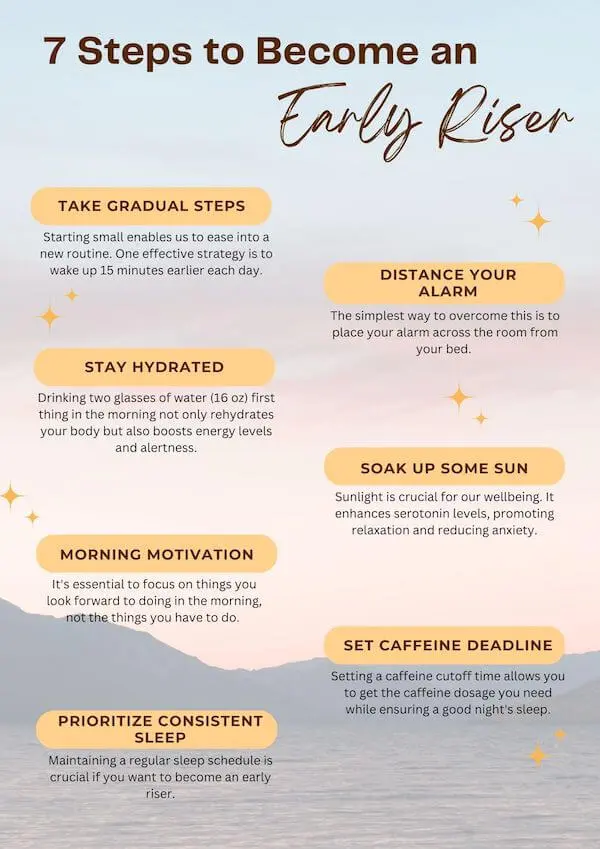
Do you struggle to get out of bed in the morning? Are you tired of feeling like you’re always playing catch-up with your day?
Don’t worry, you’re not alone.
Being a night owl was a part of my identity for as long as I could remember. But as I got older, the toll it was taking on me became too much to ignore. I felt tired all the time, my emotions were unstable, and my anxiety was off the charts.
Early risers were a foreign breed to me. As I heard more about their passion for morning routines, I became intrigued. My current lifestyle was clearly not working, so I decided to give it a try.
After I started, I haven’t looked back since.
The first step is to understand why waking up early would be valuable to you. I realized that I needed to allocate quiet time in the morning to balance my emotions. Waking up at 4 am was too premature for me. 7 am failed to calm my nerves. However, 6 am was just right.
If you thrive as a night owl, don’t feel compelled to change. You have your distinct qualities — some people are most productive during the mornings, while others excel at night. However, if you’re struggling with your current routine and desire a change, this guide is for you!
Without further delay, here are 7 actionable steps to becoming an early riser.
1. Take gradual steps
Taking a gradual approach is crucial when it comes to waking up early. Abruptly changing your wake-up time from 8 am to 5 am can be a significant shock to your body. Even if your mind is eager to make the switch, your body requires time to adapt. It’s comparable to attempting to run a 3-mile stretch without any prior training.
Starting small enables us to ease into a new routine. One effective strategy is to wake up 15 minutes earlier each day. Everyone is unique, so choose increments that are manageable for you. If you’re struggling, give yourself adequate time to adjust before moving on to the next increment.
2. Distance your alarm
Overcoming the snooze button can be one of the biggest challenges when becoming an early riser. I know it was for me. My alarm would sound next to me, and I’d instantly hit the snooze button. One snooze would turn into five, and then I was doomed.
Your initial inclination is to go back to sleep. It’s easy to rationalize hitting snooze — “9 more minutes won’t hurt.” However, what you want at the moment (more sleep) conflicts with what you want overall (to become an early riser).
The simplest way to overcome this is to place your alarm across the room from your bed. When you have to physically get up and walk over to turn it off, it’s less likely that you’ll return to bed.
3. Stay hydrated
During my early attempts, my first instinct was to flee to my coffee maker. Getting up early was already unbearable, so I craved the immediate alertness that caffeine provided. Unfortunately, the effects didn’t last, and I crashed soon after.
I came to realize that one of the main reasons for my fatigue was dehydration. Starting the day with coffee only compounded the problem by further dehydrating me after seven hours of sleep.
Drinking two glasses of water (16 oz) first thing in the morning not only rehydrates your body but also boosts energy levels and alertness. It stabilizes mood swings and provides the fuel needed to kickstart your morning routine the right way.

4. Soak up some sun
Initially unaware of the benefits of sunlight, I discovered its mood-boosting effects when I started running outside. Now, I eagerly anticipate the morning sun each day.
Sunlight is crucial for our wellbeing. It enhances serotonin levels, promoting relaxation and reducing anxiety.
Even on overcast days, you can still get vital UV light by increasing your time outside. If you can’t go outside, sitting near a window is the next best option to soak up natural light.
5. Discover your morning motivation
When starting out, I found myself with extra time in the morning but no idea how to spend it. I realized that I needed to have a purpose in mind to keep me motivated.
To start, I asked myself what activities would bring me peace and clarity. For me, it was meditation and running. However, this is unique to each person, so find something that works for you.
It’s essential to focus on things you look forward to doing in the morning, not the things you have to do.
This will help you to create a routine that is sustainable. Whether it’s working out, listening to an audiobook, or cooking a healthy breakfast, make sure you’re doing something that makes you happy.
Remember, this time is for you and your wellbeing. Everything else can wait.

6. Set your caffeine deadline
Of course, the effect of caffeine varies from person to person. While some may be able to consume coffee late in the evening without any adverse effects, many others suffer from disrupted sleep.
Even if you can fall asleep without problems, consuming caffeine can still negatively impact your sleep quality. In my case, I found that having coffee in the afternoon significantly delayed my sleep time. After some experimentation, I determined 12 pm to be my cutoff time.
If you’re a coffee lover, try different cutoff times to see what works best for you. By setting a caffeine cutoff time, you can still get the caffeine dosage you need while ensuring a good night’s sleep.
7. Prioritize consistent sleep
Maintaining a regular sleep schedule is crucial if you want to become an early riser.
Inconsistent sleep patterns can leave you feeling groggy and sabotage your morning routine. You might end up hitting snooze and missing out on precious “you” time.
Fortunately, consistently waking up early helps regulate your body’s internal clock, making it easier for you to fall asleep at a reasonable time. So set a bedtime and stick to it. Be sure to unplug from your smartphone and other electronic devices at least an hour before bed.
Learn more about how you can start incorporating healthy sleep hygiene habits.
Final Thoughts
Transitioning to waking up early is no easy task. It requires breaking old habits that we have become accustomed to. However, with determination and consistency, you can achieve your goal.
It is important to remember why you are doing this and what you hope to gain from it. By doing so, the process will be more enjoyable and less daunting.
I wish you the best of luck on this journey towards becoming an early riser!

